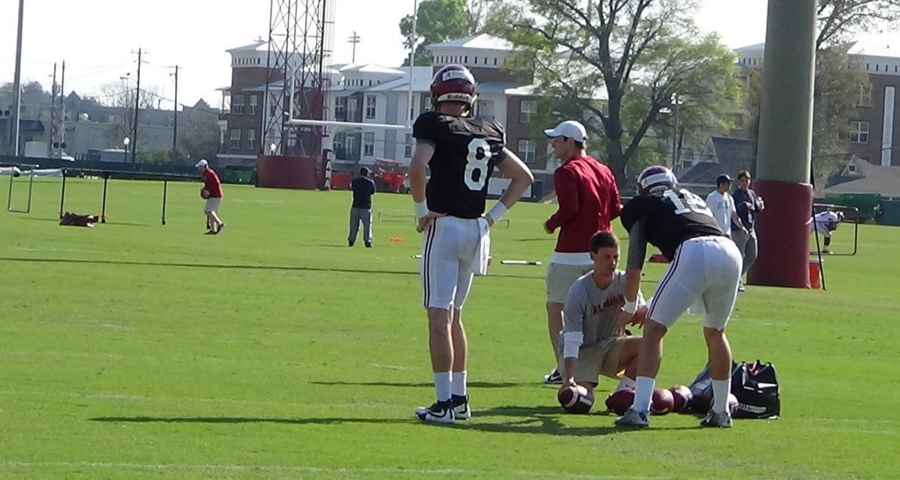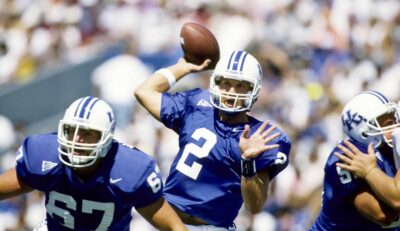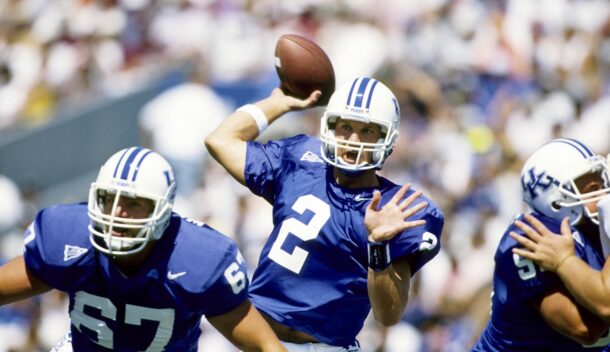
Alabama’s spring game is Saturday, but the real drama will happen after the shoulder pads are put away.
The Tide has three quarterbacks vying for the starting job, and one of the more interesting subplots is how long all three are willing to keep battling for the job.
The longer the competition plays out, obviously, the greater the chance that redshirt freshman Blake Barnett and redshirt sophomore David Cornwell keep challenging the more experienced redshirt junior Cooper Bateman.
But if we’ve learned anything in the past few seasons in the SEC, it’s that quarterbacks typically are among the first to transfer when playing time becomes the primary issue.
There’s been no such noise coming out of Tuscaloosa, yet, and Nick Saban certainly prefers it that way.
Maybe the staff genuinely doesn’t know which one of the three they will entrust to run the offense. Or maybe they have an idea but want to keep the younger quarterbacks engaged — and more important — on campus.
Texas A&M just lost two five-star quarterbacks to transfer. Florida lost Will Grier, a four-star prospect but the No. 2-rated pro-style quarterback in the 2014 class. Georgia lost Jacob Park, the No. 5-rated pro-style passer in that class.
Guess who was two spots behind Grier and one ahead of Park in those rankings? David Cornwell.
Guess who was the No. 2-rated pro-style quarterback in the 2015 class? Blake Barnett.
If Bateman, who doesn’t have a ton of game experience but has more than his competition, holds off Cornwell and Barnett for the starting job, will both young quarterbacks be patient enough to wait their turn, knowing it could be two more seasons?
It’s unlikely, at best.
Could the possibility of a transfer impact Saban’s decision? It’s possible. He could choose one of the younger quarterbacks over Bateman, knowing he’d have them for at least two more seasons, possibly three.
Former N.C. State coach Tom O’Brien made a similar decision when he was choosing between Russell Wilson and Mike Glennon — both of whom are in the NFL.
Wilson had one year remaining. Glennon had two. O’Brien, fearful of being without either a year later, committed to Glennon, and Wilson left for Wisconsin.
These are complicating factors that don’t come into play with most other positions.
Running backs, even Alabama’s, are far more accustomed to the pecking order, waiting, sharing, etc. But that’s in part because they know every carry is one fewer they have left in their legs. That’s why Bo Scarbrough didn’t mind taking a backseat to Derrick Henry, who took a backseat to T.J. Yeldon, who did the same for Eddie Lacy, who did the same for Trent Richardson, who backed up Mark Ingram, etc., etc.
Alabama might be the best at stockpiling talent, but it is hardly alone. Most SEC teams have done it, though not all as well as Alabama or Georgia, where Nick Chubb backed up Todd Gurley and Sony Michel sat behind Chubb.
Keeping quarterbacks happy is far more treacherous.
Only one plays — and storing five-star and four-star recruits in consecutive classes sounds better in February than it usually plays out in the fall.
There can only be one voice in the huddle, one face of the program.
Nine SEC programs have had a quarterback transfer since January. Several, like Grier, Patrick Towles, Johnny McCrary, Kyler Murray and Kyle Allen, were former starters.
Alabama also lost a quarterback, when reserve Alec Morris transferred to North Texas, where he will compete for the starting job.
Will it lose another?
As you watch Alabama’s spring game on Saturday, you’ll no doubt watch with an eye on this year’s quarterback race.
You might want to look a little farther in the distance.
How long can Saban keep all three of his prized quarterbacks happy — and if he’s going to lose one, which one does he want to lose the least?
Those are keys questions about the future might play into his decision about who wins the job this season.
Managing Editor
A 30-time APSE award-winning editor with previous stints at the Miami Herald, The Indianapolis Star and News & Observer, Executive Editor Chris Wright oversees editorial operations for Saturday Down South.







